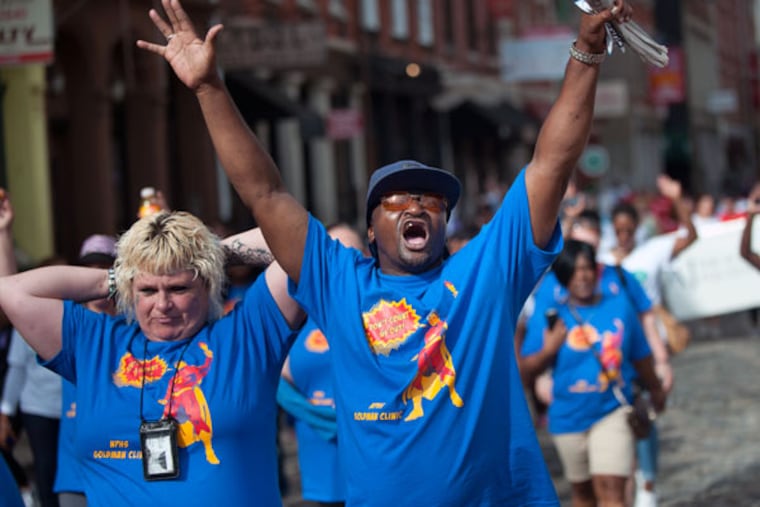Thousands march in support of, and hope for, addiction recovery
Leaning on a cane as he walked near the front of a march for sobriety Saturday, the anguished father from Quakertown said he hopes his 21-year-old, heroin-addicted daughter will turn her life around - and fast.

Leaning on a cane as he walked near the front of a march for sobriety Saturday, the anguished father from Quakertown said he hopes his 21-year-old, heroin-addicted daughter will turn her life around - and fast.
"I am hoping she will reach rock bottom soon," he said. "Otherwise, she will die."
The record 25,000 people who came out for the PRO-ACT Philadelphia Recovery Walk at Penn's Landing, the largest turnout in the event's 14-year history, had organizers convinced that the stigma of drug and alcohol addiction is lifting, but there is still a long way to go.
As street cred goes, the Recovery Walk has aimed to achieve the same level as any march to raise awareness about a debilitating disease - be it AIDS or breast cancer, said Beverly Haberle, project director of PRO-ACT, which stands for Pennsylvania Recovery Organization - Achieving Community Together.
She said the walk started with just 125 people in 2001, its inaugural year. The large growth in participation, she said, means "people are willing to stand up and be the face of recovery."
In what turned out to be a glorious morning overlooking the waterfront, hundreds began lining up at 8:45 a.m. on the Chestnut Street bridge to begin the 1.25-mile path that took them across the bridge, near Society Hill, and back to the Grand Plaza at Penn's Landing.
Among them was Mandi Haney, 35, who is living at a recovery home in Mount Airy called WomanSpace. She and eight other women took public transit to the event and held up a WomanSpace banner and chanted, "Hugs, not Drugs."
Haney has been clean for 151 days - overcoming the grip of heroin that robbed her of 18 years. She began using at 17 when her best friend in Woodstown, Salem County, asked her if she wanted to try it.
Her heroin habit escalated to $200 to $400 a day, and Haney panhandled in Camden and Philadelphia to support it. She was homeless and lived on the streets for five years, once narrowly escaping being raped, she said.
"I'm very grateful and humble," said Haney, who has her family back in her life now, and a new boyfriend. "I'm blessed every day where I wake up to a life I had before, and have a chance to live again."
The recovery walk drew a diverse crowd. There were mothers and fathers pushing baby strollers. Representatives of local rehab programs staffed information booths. Sobriety sponsors were there showing their support.
"We were afraid that people weren't coming into the city this weekend because of all the planning for the pope," Haberle said, but what "could have been a perfect storm" of keeping people away "turned out to be a rainbow." In previous years, she said, New Jersey sent 17 to 25 buses. But the Garden State had its own walk-for-sobriety event this year in North Jersey.
Haberle said the event at Penn's Landing still got busloads from Atlantic City and Camden. Three buses came from Bucks County and three from Chester County.
Speakers from federal substance abuse agencies in Washington also came, as did Mayor Nutter, who danced and rapped on stage after the walk. Also present were 10 legislators from Harrisburg and members of City Council.
"You made it another year," State Sen. Shirley Kitchen (D., Philadelphia) said on stage. Her speech focused on the need for more resources for treatment. "We will fight this. Stay strong."
Deb Rosica, 53, of Warringon, Bucks County, a Web developer, said her son, Anthony Napolitano, now 21, is one of the strongest people she knows because he beat his heroin addiction. Mother and son walked side by side Saturday.
"It was rough for the whole family," Rosica said, recalling the period when her son was deep in his addiction and was stealing from the family.
"We're here to celebrate," she said. "He faced his demons, and now works and helps other people. He pays it forward."
Three hundred members of PRO-ACT's "Honor Guard," each with at least 10 years of sobriety, led the march and welcomed people back.
Among them was Wallace Lewis, 48, who is on disability and lives in the Lawncrest section in Northeast Philadelphia. He has been a volunteer with PRO-ACT since 2008.
Lewis is a recovering alcoholic who started drinking when he was 5. He became a full-blown alcoholic at 15 and got kicked out of his parents' home at 17. For the last 26 years, he said, he has been sober.
In 1989, Lewis said, he crawled out of a car in a junkyard where he had been living for nearly a year, and decided to get help. He was 22.
"The easiest thing for me to do is put down the drink," Lewis said. "The hardest is to work on myself - to change my behavior and attitude.
"That's recovery and that's why I walk," he said. "It gives people hope."
sparmley@phillynews.com215-854-4184